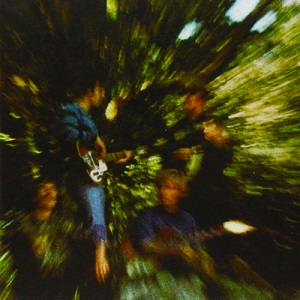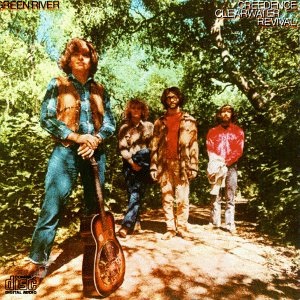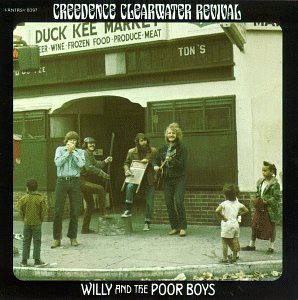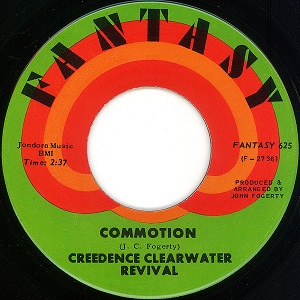
Creedence Clearwater Revival, commonly abbreviated as CCR or simply Creedence, was an American rock band formed in El Cerrito, California. The band consisted of lead vocalist, lead guitarist, and primary songwriter John Fogerty, his brother, rhythm guitarist Tom Fogerty, bassist Stu Cook, and drummer Doug Clifford. These members had played together since 1959, first as the Blue Velvets and later as the Golliwogs, before settling on Creedence Clearwater Revival in 1967. The band's most prolific and successful period between 1969 and 1971 produced fourteen consecutive Top 10 singles and five consecutive Top 10 albums in the United States, two of which – Green River (1969) and Cosmo's Factory (1970) — topped the Billboard 200 chart. The band performed at the 1969 Woodstock festival in Upstate New York, and was the first major act signed to appear there.

John Cameron Fogerty is an American singer, songwriter and guitarist. Together with Doug Clifford, Stu Cook, and his brother Tom Fogerty, he founded the swamp rock band Creedence Clearwater Revival (CCR), for which he was the lead singer, lead guitarist, and principal songwriter. CCR had nine top-10 singles and eight gold albums between 1968 and 1972, and was inducted into the Rock and Roll Hall of Fame in 1993.

Cosmo's Factory is the fifth studio album by the American rock band Creedence Clearwater Revival, released by Fantasy Records on July 16, 1970. Six of the album's eleven tracks were released as singles in 1970, and all of them charted in the top 5 of the Billboard Hot 100. The album spent nine consecutive weeks in the number one position on the Billboard 200 chart and was certified 4x platinum by the Recording Industry Association of America (RIAA) in 1990. Rolling Stone ranked it number 413 on its 2020 list of the "500 Greatest Albums of All Time".

Creedence Clearwater Revival is the debut studio album by the American rock band Creedence Clearwater Revival, released in July 1968, by Fantasy Records in the US. Featuring the band's first hit single, "Susie Q", which reached number 11 in the US charts, it was recorded shortly after the band changed its name from the Golliwogs and began developing a signature swamp rock sound.

Bayou Country is the second studio album by the American rock band Creedence Clearwater Revival, released by Fantasy Records on January 15, 1969, and was the first of three albums CCR released in that year. Bayou Country reached number 7 on the Billboard 200 chart and produced the band's first No. 2 hit single, "Proud Mary".

Green River is the third studio album by the American rock band Creedence Clearwater Revival, released on August 7, 1969 by Fantasy Records. It was the second of three albums they released in that year, preceded by Bayou Country in January and followed by Willy and the Poor Boys in October.

Willy and the Poor Boys is the fourth studio album by the American rock band Creedence Clearwater Revival, released on October 29, 1969, by Fantasy Records. It was the last of three studio albums the band released that year, arriving just three months after Green River. In 2020, Rolling Stone ranked the album number 193 on its list of the "500 Greatest Albums of All Time".

Pendulum is the sixth studio album by the American rock band Creedence Clearwater Revival, released by Fantasy Records on December 9, 1970. It was the second studio album the band released that year, arriving five months after Cosmo's Factory.

Mardi Gras is the seventh and final studio album by the American rock band Creedence Clearwater Revival, released on April 11, 1972 by Fantasy Records. Recorded after the departure of guitarist Tom Fogerty, it was the band's only studio album as a trio, and featured songs written, sung, and produced by each of the remaining members, rather than just John Fogerty. The recording sessions were marred by personal and creative tensions, and the group disbanded after a short U.S. tour to support the album.

Live in Europe is the first live album by American rock band Creedence Clearwater Revival. Although released in 1973, it was recorded in 1971 during the Pendulum tour.

The Concert is the second live album by American rock band Creedence Clearwater Revival, released by Fantasy Records in October 1980. It was recorded at the Oakland–Alameda County Coliseum Arena in Oakland, California, on January 31, 1970.

Chronicle, or fully Chronicle: The 20 Greatest Hits, is a greatest hits album by the American rock band Creedence Clearwater Revival. It was released in January 1976 by Fantasy Records. The edited version of "I Heard It Through the Grapevine" featured on the album was simultaneously released as a single.

"Run Through the Jungle" is a 1970 song by American rock band Creedence Clearwater Revival. It was released as a double A-side single with "Up Around the Bend" and on the album Cosmo's Factory.
"Who'll Stop the Rain" is a song written by John Fogerty and originally recorded by Creedence Clearwater Revival for their 1970 album Cosmo's Factory. Backed with "Travelin' Band", it was one of three double-sided singles from that album to reach the top five on the Billboard Pop Singles chart and the first of two to reach the No. 2 spot on the American charts, alongside "Lookin' Out My Back Door"/"Long As I Can See the Light". In 2004, Rolling Stone ranked it No. 188 on its "500 Greatest Songs of All Time" list.

"Green River" is a song by American rock band Creedence Clearwater Revival. It was written by John Fogerty and released as a single in July 1969, one month before the album of the same name was released. "Green River" peaked at number two for one week, behind "Sugar, Sugar" by The Archies, and was ranked by Billboard as the No. 31 song of 1969.

"Long As I Can See the Light" is a song by American rock band Creedence Clearwater Revival, from the album Cosmo's Factory. Released as the flip side of the single "Lookin' Out My Back Door" in 1970, it reached number 57 on the Cash Box singles chart in the US, number 20 in the UK, and number one in Norway.

"Commotion" is a song by Creedence Clearwater Revival from the album Green River, and was also the B-side of the single release of the album's title track. In 1980, "Tombstone Shadow" b/w "Commotion'" was released as a single in the United States. While released as a B-side, "Commotion" reached #30 in the United States on the Billboard Hot 100 and #16 in Germany. It was written by John Fogerty and recorded at Wally Heider's Studios in San Francisco in June 1969. The 45rpm was the debut session of the band at Wally Heider's and the first collaboration with engineer Russ Gary.

"It Came Out of the Sky" is a song written by John Fogerty that was included on Creedence Clearwater Revival's 1969 album Willy and the Poor Boys. It was also released as a single in some countries and has appeared on several of the group's compilation albums. It was included occasionally in the group's live set even after John Fogerty left the group and the remaining members reformed as Creedence Clearwater Revisited.
"Don't Look Now " is a song written by John Fogerty that was first released on Creedence Clearwater Revival's 1969 album Willy and the Poor Boys. It has also appeared on several of the group's live and compilation albums. It was covered by Minutemen on their 1984 album Double Nickels on the Dime.
"Keep On Chooglin'" is a song written by John Fogerty that was first released as the final song on Creedence Clearwater Revival's 1969 album Bayou Country. The song was often used to close Creedence Clearwater Revival concerts and was later covered by several other artists including Fogerty as a solo artist. The song popularized the neologism "chooglin'."

















